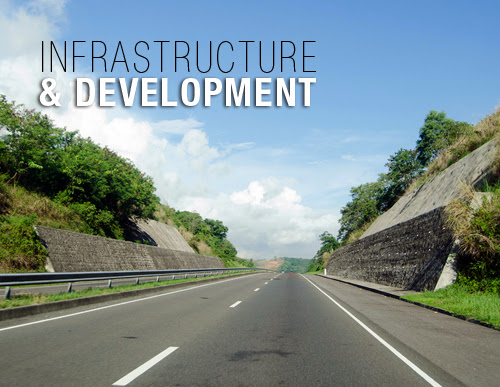
One of the key factors for the economic success of East Asian countries is infrastructure quality. Research suggests that when infrastructure is inadequate or infrastructure services are unreliable, investments and growth are constrained. East Asian countries that have invested on infrastructure have a competitive edge over others. The Philippines, unfortunately, has underinvested in infrastructure over the years, and is only now beginning to scale up investments via public-private partnerships or PPP. The country’s infrastructure investments have averaged at just two percent of gross domestic product in recent years, way below the five-percent level in neighboring countries in the Association of Southeast Asian Nations (ASEAN). In the Global Competitiveness Report 2012-2013 of the World Economic Forum, the Philippines ranked 98th among 144 countries in terms of quality of overall infrastructure. It got the lowest rank in terms of quality of port infrastructure (120th) and air transport infrastructure (112th).
Key reforms have expanded the fiscal space, allowing the government to increase spending on social services and making its annual budget outlay more inclusive. The passage of Republic Act 10351 or the “sin tax” law, which raised the excise taxes on tobacco products and alcohol, has yielded billions for the universal health care program, the improvement of health facilities, and the attainment of the Millennium Development Goals. Analysis made by PIDS Senior Research Fellow Rosario Manasan on the various versions of the sin tax bill provided valuable inputs to legislators during deliberations on the tax measure. Manasan notes that the bicameral version of the bill has greatly simplified the excise tax structure, easing tax administration by minimizing opportunities for mis-classification or mis-declaration of goods and transactions. PIDS has also provided research support for a signature budget reform of the Aquino II Administration: zero-based budgeting (ZBB), which aims to do away with wasteful incremental budgeting and ensure fiscal discipline. Among the ZBB studies conducted by PIDS researchers pertain to the cost-efficiency and effectiveness of sitio and household electrification, reforestation, housing resettlement, and agricultural support programs.
Still, the latest Analysis of the President’s Budget by Dr. Manasan shows that the country’s fiscal space remains limited. Although the government has arrived at a more balanced budget distribution between social and economic services in the 2013 national budget, it continues to underinvest in certain basic services. For instance, our 2013 education budget still pales in comparison with those of our Southeast Asian neighbors. Low priority was also given to national defense, a critical area given current geopolitical issues.
Research by PIDS has identified opportunities for the country and factors inhibiting investments in infrastructure projects. A study by Gilberto Llanto, PIDS president, found a significant link between rural infrastructure and agricultural productivity, and that electricity and roads are significant determinants of agricultural productivity. Moreover, access to electricity creates various income-earning opportunities for rural households. A separate paper by Llanto on Mindanao’s high-value crops sector points out that “better and more reliable road and transport infrastructure will help to expand production, increase value-added of those commodities, generate employment, and contribute to poverty reduction.” To do this, the Philippines needs to widen its fiscal space such as using more cost-efficient approaches like PPP.
At the regional level, PIDS senior research fellow Adoracion Navarro has helped put together a clear pathway for energy market integration, a cross-border infrastructure initiative under the plan for ASEAN Energy Market Integration, which is envisioned to solve the energy crisis in Southeast Asia where 130 million people still lack access to electricity. Navarro notes that an ASEAN accord on energy market integration can assist ASEAN countries in identifying technical solutions that are best suited for the types of demand when defining their sources of financing toward improving the availability of and people’s access to cleaner and more efficient energy sources. Investment requirements and financing options should consider the needs of the energy-poor, she adds.
Know more about what PIDS studies have to say about infrastructure and development. Understand the issues related to the country’s build-operate-transfer scheme, the role of transport and logistics infrastructure in interregional trade, local service delivery of potable water, and others. Visit the SocioEconomic Research Portal for the Philippines to access the latest PIDS research on infrastructure as well as related topics. Simply type ‘infrastructure’ in the Search box.
The impact of infrastructure on agricultural productivity
Does poor rural infrastructure constrain agricultural productivity?
How critical is transport and logistics infrastructure to interregional trade? The case of high-value fruits and vegetables in Mindanao
An assessment of the local service delivery of potable water in Dumaguete City and selected areas of Agusan del Sur province
It’s all in the contract: A closer look at BOT
A review of build operate transfer for infrastructure development
Governmental fiscal support for financing long-term infrastructure projects in ASEAN countries
Interregional trade of high-value fruits and vegetables: Issues on transport and shipping
Investing in local roads for better mobility of people, goods, and services
Water financing programs: creating incentives for private sector participation
Key reforms have expanded the fiscal space, allowing the government to increase spending on social services and making its annual budget outlay more inclusive. The passage of Republic Act 10351 or the “sin tax” law, which raised the excise taxes on tobacco products and alcohol, has yielded billions for the universal health care program, the improvement of health facilities, and the attainment of the Millennium Development Goals. Analysis made by PIDS Senior Research Fellow Rosario Manasan on the various versions of the sin tax bill provided valuable inputs to legislators during deliberations on the tax measure. Manasan notes that the bicameral version of the bill has greatly simplified the excise tax structure, easing tax administration by minimizing opportunities for mis-classification or mis-declaration of goods and transactions. PIDS has also provided research support for a signature budget reform of the Aquino II Administration: zero-based budgeting (ZBB), which aims to do away with wasteful incremental budgeting and ensure fiscal discipline. Among the ZBB studies conducted by PIDS researchers pertain to the cost-efficiency and effectiveness of sitio and household electrification, reforestation, housing resettlement, and agricultural support programs.
Still, the latest Analysis of the President’s Budget by Dr. Manasan shows that the country’s fiscal space remains limited. Although the government has arrived at a more balanced budget distribution between social and economic services in the 2013 national budget, it continues to underinvest in certain basic services. For instance, our 2013 education budget still pales in comparison with those of our Southeast Asian neighbors. Low priority was also given to national defense, a critical area given current geopolitical issues.
Research by PIDS has identified opportunities for the country and factors inhibiting investments in infrastructure projects. A study by Gilberto Llanto, PIDS president, found a significant link between rural infrastructure and agricultural productivity, and that electricity and roads are significant determinants of agricultural productivity. Moreover, access to electricity creates various income-earning opportunities for rural households. A separate paper by Llanto on Mindanao’s high-value crops sector points out that “better and more reliable road and transport infrastructure will help to expand production, increase value-added of those commodities, generate employment, and contribute to poverty reduction.” To do this, the Philippines needs to widen its fiscal space such as using more cost-efficient approaches like PPP.
At the regional level, PIDS senior research fellow Adoracion Navarro has helped put together a clear pathway for energy market integration, a cross-border infrastructure initiative under the plan for ASEAN Energy Market Integration, which is envisioned to solve the energy crisis in Southeast Asia where 130 million people still lack access to electricity. Navarro notes that an ASEAN accord on energy market integration can assist ASEAN countries in identifying technical solutions that are best suited for the types of demand when defining their sources of financing toward improving the availability of and people’s access to cleaner and more efficient energy sources. Investment requirements and financing options should consider the needs of the energy-poor, she adds.
Know more about what PIDS studies have to say about infrastructure and development. Understand the issues related to the country’s build-operate-transfer scheme, the role of transport and logistics infrastructure in interregional trade, local service delivery of potable water, and others. Visit the SocioEconomic Research Portal for the Philippines to access the latest PIDS research on infrastructure as well as related topics. Simply type ‘infrastructure’ in the Search box.
The impact of infrastructure on agricultural productivity
Does poor rural infrastructure constrain agricultural productivity?
How critical is transport and logistics infrastructure to interregional trade? The case of high-value fruits and vegetables in Mindanao
An assessment of the local service delivery of potable water in Dumaguete City and selected areas of Agusan del Sur province
It’s all in the contract: A closer look at BOT
A review of build operate transfer for infrastructure development
Governmental fiscal support for financing long-term infrastructure projects in ASEAN countries
Interregional trade of high-value fruits and vegetables: Issues on transport and shipping
Investing in local roads for better mobility of people, goods, and services
Water financing programs: creating incentives for private sector participation












